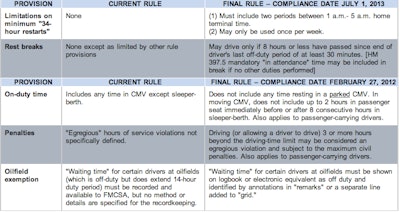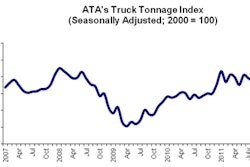
While the final rule retains the current 11-hour daily driving limit — FMCSA previously was in favor of reducing it to 10 hours — it reduces by 12 hours the maximum number of hours a truck driver can work within a week. Under the old rule, truck drivers could work on average up to 82 hours within a seven-day period. The new HOS final rule limits a driver’s work week to 70 hours. FMCSA says it will continue to conduct data analysis and research to further examine any risks associated with the 11 hours of driving time.
In addition, truck drivers cannot drive after working eight hours without first taking a break of at least 30 minutes. Drivers can take the 30-minute break whenever they need rest during the eight-hour window.
The rule also requires truck drivers who maximize their weekly work hours to take at least two nights’ rest when their 24-hour body clock demands sleep the most – from 1 a.m. to 5 a.m. This rest requirement is part of the rule’s “34-hour restart” provision that allows drivers to restart the clock on their work week by taking at least 34 consecutive hours off-duty. The final rule allows drivers to use the restart provision only once during a seven-day period.
 Click image to see changes to HOS requirements (Source: FMCSA)
Click image to see changes to HOS requirements (Source: FMCSA)Companies and drivers that commit egregious violations of the rule could face the maximum penalties for each offense. Trucking companies that allow drivers to exceed the 11-hour driving limit by 3 or more hours could be fined $11,000 per offense, and the drivers themselves could face civil penalties of up to $2,750 for each offense.
“Trucking is a difficult job, and a big rig can be deadly when a driver is tired and overworked,” said U.S. Transportation Secretary Ray LaHood. “This final rule will help prevent fatigue-related truck crashes and save lives. Truck drivers deserve a work environment that allows them to perform their jobs safely.”
As part of the HOS rulemaking process, FMCSA held six public listening sessions across the country and encouraged safety advocates, drivers, truck company owners, law enforcement and the public to share their input on HOS requirements. The listening sessions were live webcast on the FMCSA Website, allowing a broad cross-section of individuals to participate in the development of this safety-critical rule.
“This final rule is the culmination of the most extensive and transparent public outreach effort in our agency’s history,” said FMCSA Administrator Anne Ferro. “With robust input from all areas of the trucking community, coupled with the latest scientific research, we carefully crafted a rule acknowledging that when truckers are rested, alert and focused on safety, it makes our roadways safer.
Industry groups were quick to weigh in and blast FMCSA’s newest measure.
“Even with an uptick in truck-involved fatalities in 2010, since the current rules went into effect in 2004, fatalities have fallen 29.9%, even as overall miles traveled for trucks has risen by tens of billions of miles,” said American Trucking Associations Chairman Dan England, chairman of C.R. England, Salt Lake City. “Both the trucking industry and consumers will suffer the impact of reduced productivity and higher costs. Also, groups that have historically been critical of the current hours of service rules won’t be happy since they will have once again failed to obtain an unjustified reduction in allowable daily driving time. Further, it is entirely possible that these changes may actually increase truck-involved crashes by forcing trucks to have more interaction with passenger vehicles and increasing the risk to all drivers.”
“Collectively, the changes in this rule will have a dramatic effect on the lives and livelihoods of small-business truckers. The changes are unnecessary and unwelcome and will result in no significant safety gains,” said Owner-Operators Independent Drivers Association Executive Vice President Todd Spencer. “Compliance with any regulation is already a challenge because everyone else in the supply chain is free to waste the driver’s time loading or unloading with no accountability.”
John Cutler, NASSTRAC’s legal counsel, said FMCSA’s new rules will adversely impact productivity for trucking companies and their shipper customers for little or no safety benefit. “Though FMCSA preserved the 34-hour restart provision, these changes dramatically increase the disruptiveness of such rest periods by mandating that they take place between one o’clock and five o’clock in the morning,” said Cutler. “The effect is that down time due to restarts will increase significantly, and many drivers will start driving on Monday mornings, forcing thousands of trucks onto our roadways in rush hour and dramatically increasing traffic congestion.”
Safety advocates and the Teamsters weren’t pleased with the rule, either. The Advocates for Highway and Auto Safety said that with fatalities in truck crashes higher in 2010 than in years past, the decision to retain the 11-hour rule will lead to more highway truck deaths. Advocates – along with Public Citizen, Citizens for Reliable and Safe Highways, Parents Against Tired Truckers and the International Brotherhood of Teamsters – opposed the 2003 rule and twice have sued to change it, and said that it was confident that the court will reach the same result when the new rule comes before it for judgment.
“By keeping the unsafe portion of the rule that permits truckers to drive for 11 consecutive hours, Department officials have broken their promise to make safety their number one priority,” said Henry Jasny, vice president and general counsel of Advocates. “And since the Department estimates that 500 people are killed each year in truck driver fatigue-related crashes, leaving this provision in the rule is unconscionable.”
Commercial truck drivers and companies must comply with the HOS final rule by July 1, 2013. The Federal Register posted the rule for inspection on Friday, Dec. 23, and it will publish the rule on Tuesday, Dec. 27. The final rule is available for viewing on FMCSA’s Website at https://www.fmcsa.dot.gov/HOSFinalRule.











